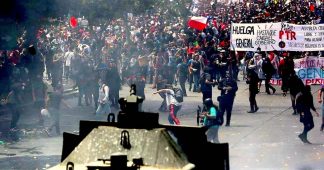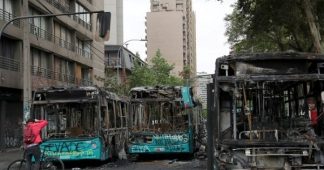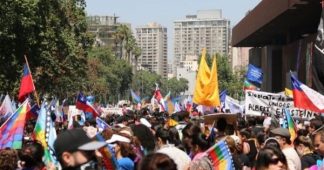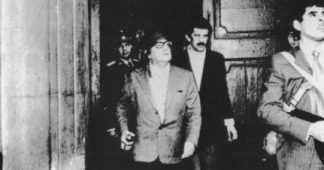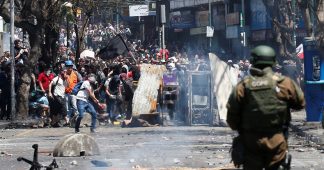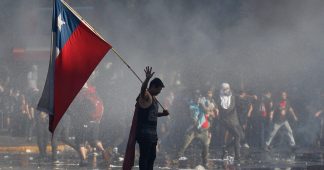by Franck Gaudichaud
19 November 2019
Franck Gaudichaud is a specialist of contemporary Chile, president of the association France Amerique Latine and member of the editorial board of Contretemps. He is a political scientist and teaches Latin American history at the University of Toulouse Jean Jaurès, France (1). Here he develops several hypothesis bout Chile and the development of the current mobilization which has been ongoing since mid-October.
Révolution Permanente: According to mainstream analysts and economists, Chile was an island of stability and prosperity in Latin America. In view of the current mobilizations, how do you explain such a generalized explosion of anger?
FG: We can say that, in effect, the Chilean ruling classes really sold the image of a “Chilean Jaguar” as an indisputable model of economic growth for Latin America. President Sebastián Piñera even spoke of an “oasis of stability” in Latin American. Less than a week after these remarks, we witnessed the beginning of an unprecedented mobilization and then the president declared on television that: “the country is at war”. In reality, behind this showcase of “modern” and neoliberal Chile we find some of the deepest social inequalities in the world and especially in Latin America. The violence of capitalism applied since 1973 with the dictatorship and after 1975 with the “neoliberal turn” brought about by the Chicago Boys, was continued after the 1990s under the various democratic governments.
Thus, this model of neoliberal capitalism, sometimes called “advanced”, is an extreme model. There was a widespread privatization in all fields and social spheres (education, healthcare, pensions, transport, etc.). And although poverty has been reduced by half since the 1990s, social inequalities have continued to grow. This means that, at present, the country’s economy is dominated by seven large families of the Chilean bourgeoisie while half of all workers earn less than $530 USD per month (while the price of a one-way metro ticket in Santiago is $1.10 USD). The “democracy of consensus” born in 1990 legitimized this “model” and the elites agreed to keep (with some reforms) the illegitimate Constitution drawn up in 1980, in the midst of the dictatorship.
RP: Undoubtedly, one of the distinctive features of the current Chilean process is the mobilization of the labor movement that the dictatorship wanted to crush and which the governments after 1989 have tried to break up. Are we witnessing an authentic renewal of the workers’ movement?
FG: The current social explosion is linked to an accumulation of previous collective experiences, such as large mobilizations of workers from 2006-07, and also protests of high school and university students. Let us recall the “student revolution” of 2011. There was also the multiplication of eco-territorial struggles around what are called “sacrificial zones” in Chile, zones of massive extractive activity and serious ecological and environmental destruction. We should also mention the important mobilizations around the pension system which is completely privatized and in the hands of pension funds (this privatization was brought about by the brother of the current president during the dictatorship…). Among the working class, the most combative union sectors are the port workers, the miners and the truck drivers, which have been at the forefront as well as other sectors of workers such as teachers and the healthcare workers.
One of the distinctive traits of the current movement is that it was not brought about by the traditional worker’s movement. What emerges quickly are youth struggles, the unemployed youth, middle-schoolers, and the high school students that begin to jump the turnstiles of the Santiago subway and who called for massive, collective fare evasions. With the repression, the militarization of public space, and the proclamation of the state of emergency and the curfew, we witnessed the expansion of mobilized social spaces that reject repression and similarly the expansion of broad demands critical of neoliberalism. It is then that some sectors of the workers’ movement begin to enter the scene, and in particular those of strategic and more politicized trade unions. Particularly noteworthy is the key role played by the dockworkers of the “Unión Portuaria”, who called for a strike starting on Monday, October 21, while the large union federation, the Central Única de los Trabajadores (CUT), for its part, was largely paralyzed. The CUT is a widely bureaucratized trade union in the hands of the political parties that have governed over the last three decades, the Socialist Party, the Christian Democrats and now also the Communist Party. Nevertheless, the unions and the CUT eventually participated although some in the leadership and other organizations were hitting the breaks. It is interesting to observe the role of the dockers and miners, especially those of the big mine “la Escondida”, which called for mobilizations and strikes. Finally, the appearance on the scene of a broad unifying initiative, the “Unidad Social”, which includes the CUT, the “No+AFP” movement against pension funds, as well as the feminist March 8 Coordination, the sectors of the political ecology and several dozen social and trade union organizations, was a notable step forward, under the pressure of the mobilizations. It is therefore a much broader space than trade unionism alone, although in the calls for a national strike the unions have played an important role in changing the balance of power and pushing back the President, particularly with regard to the state of emergency.
However, the Chilean trade union movement remains weak and fragmented as a result of the crushing defeat by the Pinochet dictatorship between 1973 and 1989. But it is also the result of the civilian governments of the Concertación (1990-2010 in particular), which did nothing to change this situation; quite the contrary, they did everything possible to maintain trade union activity directly allied with the governments and which was otherwise repressed and fragmented. Today, therefore, the challenge is to rebuild combative trade union collectives that can shift the weight of some of the more traditional union leaderships. We see that at this stage the organization of “the Social Unity” is much broader than the CUT alone. It is a space of organization and tensions that has allowed organizers to give a possible orientation and direction to the mobilizations, but with the risk of the temptation of wanting to capitalize them on the part of some and direct them “from above”, which would channel the extraordinary force of the movement towards an institutional framework of “consensus” with the government.
RP: In the demonstrations and strikes, one of the most repeated slogans continues to be “Fuera Piñera!” Which calls on the President to step down immediately. However, the radical left, the Chilean Communist Party and the Frente Amplio—which have, as you say, an important weight in the trade union movement and the social movement—have refused to take up this demand in favor of an “impeachment” of Piñera or some of his former ministers or in favor of a referendum. How do you explain such a political decision?
FG: There is a strong demand among the people mobilized around Piñera’s departure, the “Fuera Piñera!” demand, in my opinion, is totally legitimate when we are talking about 20 dead people, hundreds of wounded (including some very serious), thousands of detainees, dozens of sexual abuses and tortures in police stations, disappeared, etc. The social reforms announced by the Government are by no means accepted in the streets because they consist, once again, of State subsidies for the minimum wage, the privatized pension system and finally the private sector… Therefore, it does not propose any departure from the neoliberal subsidiary State. Nor is the change of cabinet considered as a measure of real change. On the other hand, the reaction of the parliamentary political opposition has been more than timid, if not disastrous. Some in the opposition have even called for repression, as is the case of the former socialist minister and former leader of the Organization of American States (OAS), José Miguel Insulza. On the part of the CP there was a different reaction. With their long-standing political experience, the communists quickly understood the trap represented by negotiating with Piñera, so they called for a boycott of those negotiation meetings. As for the Frente Amplio, we see to what extent it is split by contradictory tendencies and the fragility of its project, at this stage, because there is an important sector, called “Democratic Revolution”, that wanted to go to negotiate with the President in La Moneda in the middle of the state of emergency and with repression going on in the streets! In the end, the Frente Amplio did not go to negotiate and instead denounced these maneuvers. But we can see the difficulties of the Frente Amplio in positioning itself at such a juncture of exceptional mobilizations, when I believe that this should have been a key moment for the left to push towards a rupture with the neoliberal capitalist model, to call immediately for a Constituent Assembly, and to call for the Government to step down. But Frente Amplio was very confused, with sectors marked by the parliamentary logic of “negotiation” in complete dissonance with what is happening in the country, although it should be noted that the left sector of the FA, Social Convergence, has been clearer in that sense and also mobilized from the beginning.
There are, therefore, calls for “impeachment” against Piñera (with few possibilities of passing at the Senate level). Some also think that it would be possible to negotiate minimum agreements with the new Cabinet. But what is growing within the movement, in terms of what could be called a “transitory demand” for unity, is above all the call for a Free, Sovereign, and Popular Constituent Assembly constituted “from below,” that is representative and proportional, and truly democratic, unlike all Chilean constitutions, not just Pinochet’s. This process would allow everything to be put on the table and then be approved by a referendum as a sort of “refoundation” of the Chilean social and political model. The left-wing, anti-capitalist forces should have a role to play in this regard. Except if it is an attempt by the Parliament to reabsorb and channel the mobilizations to a new constitutional reform (as the PS and sectors of the right are already proposing). But, on the contrary, the radical left should get involved to grow self-organization and politicization in a process in which the Constituent and Popular Assembly would be nothing more than one of the elements of an open process of democratization that would have to question and oppose the exorbitant privileges of the Chilean bourgeoisie.
RP: The elements of self-organization that appear in the work centers and at a regional level, in Concepción for example with the Provincial Assembly or in Antofagasta with the “Emergency Committee”, give a “70’s” air to the current mobilization. Does the imaginary of the communal Comandos or the Cordones industriales, the active wing of the revolutionary process 1970-1973, does it continue to haunt Chile?
FG: In terms of the elements of self-organization, they have been very powerful in this movement, in the sense that it is a “spontaneous” movement that spread through social networks, through Facebook, horizontally and outside the traditional institutional channels (union, social or political). We see, once again, that there is a great accumulated experience coming from the previous movements, from the labor conflicts of 2006-07, from those of the students of 2011, from experience of groups like the ACES (Coordinating Assembly of Secondary Students) or from the feminist and union movements, with the organization of multiple “town halls” and territorial and popular assemblies. These are potential social forces of the movement but which are difficult to assess the extent of this assemblies at the national level. They are still dispersed and uneven depending on each place, while the levels of state repression remain scandalous. Somehow the collective memory of “popular power” and the industrial cordons of 1970-73 remains, although not always directly. We are, of course, very far from the levels of politicization and mobilization of the 1970s that characterized the Chilean working class with the experience of Unidad Popular, a working class that even began to surpass the limits proposed by Salvador Allende.
Today, we are at the beginning of the end of neoliberalism in the face of Piñera’s government, but also potentially “re-institutional” in the sense that Chile is once again speaking, on a massive scale, of a post-neoliberal and democratic perspective that would seek to overcome – finally – Pinochet’s legacy and 30 years of a “negotiated democracy”. This is already one of the formidable achievements of these days of rebellion in October 2019 even though they don’t open anti-capitalist perspectives for the time being. It is necessary to understand that the Chilean “model” still remains one of the most entrenched and “anchored” in Latin America, despite all the strong shocks that traverse it.
Interview by Jean Baptiste Thomas and Julien Anchaing
Translation by Héctor A. Rivera : https://www.puntorojomag.org/2019/11/17/we-are-at-beginning-of-the-end-of-neoliberalism-in-chile/
« We are at the beginning of the end of neoliberalism in Chile »
19 November 2019 by Franck Gaudichaud

Franck Gaudichaud is a specialist of contemporary Chile, president of the association France Amerique Latine and member of the editorial board of Contretemps. He is a political scientist and teaches Latin American history at the University of Toulouse Jean Jaurès, France (1). Here he develops several hypothesis bout Chile and the development of the current mobilization which has been ongoing since mid-October.
Révolution Permanente: According to mainstream analysts and economists, Chile was an island of stability and prosperity in Latin America. In view of the current mobilizations, how do you explain such a generalized explosion of anger?
FG: We can say that, in effect, the Chilean ruling classes really sold the image of a “Chilean Jaguar” as an indisputable model of economic growth for Latin America. President Sebastián Piñera even spoke of an “oasis of stability” in Latin American. Less than a week after these remarks, we witnessed the beginning of an unprecedented mobilization and then the president declared on television that: “the country is at war”. In reality, behind this showcase of “modern” and neoliberal Chile we find some of the deepest social inequalities in the world and especially in Latin America. The violence of capitalism applied since 1973 with the dictatorship and after 1975 with the “neoliberal turn” brought about by the Chicago Boys, was continued after the 1990s under the various democratic governments.
Thus, this model of neoliberal capitalism, sometimes called “advanced”, is an extreme model. There was a widespread privatization in all fields and social spheres (education, healthcare, pensions, transport, etc.). And although poverty has been reduced by half since the 1990s, social inequalities have continued to grow. This means that, at present, the country’s economy is dominated by seven large families of the Chilean bourgeoisie while half of all workers earn less than $530 USD per month (while the price of a one-way metro ticket in Santiago is $1.10 USD). The “democracy of consensus” born in 1990 legitimized this “model” and the elites agreed to keep (with some reforms) the illegitimate Constitution drawn up in 1980, in the midst of the dictatorship.
RP: Undoubtedly, one of the distinctive features of the current Chilean process is the mobilization of the labor movement that the dictatorship wanted to crush and which the governments after 1989 have tried to break up. Are we witnessing an authentic renewal of the workers’ movement?
FG: The current social explosion is linked to an accumulation of previous collective experiences, such as large mobilizations of workers from 2006-07, and also protests of high school and university students. Let us recall the “student revolution” of 2011. There was also the multiplication of eco-territorial struggles around what are called “sacrificial zones” in Chile, zones of massive extractive activity and serious ecological and environmental destruction. We should also mention the important mobilizations around the pension system which is completely privatized and in the hands of pension funds (this privatization was brought about by the brother of the current president during the dictatorship…). Among the working class, the most combative union sectors are the port workers, the miners and the truck drivers, which have been at the forefront as well as other sectors of workers such as teachers and the healthcare workers.
One of the distinctive traits of the current movement is that it was not brought about by the traditional worker’s movement. What emerges quickly are youth struggles, the unemployed youth, middle-schoolers, and the high school students that begin to jump the turnstiles of the Santiago subway and who called for massive, collective fare evasions. With the repression, the militarization of public space, and the proclamation of the state of emergency and the curfew, we witnessed the expansion of mobilized social spaces that reject repression and similarly the expansion of broad demands critical of neoliberalism. It is then that some sectors of the workers’ movement begin to enter the scene, and in particular those of strategic and more politicized trade unions. Particularly noteworthy is the key role played by the dockworkers of the “Unión Portuaria”, who called for a strike starting on Monday, October 21, while the large union federation, the Central Única de los Trabajadores (CUT), for its part, was largely paralyzed. The CUT is a widely bureaucratized trade union in the hands of the political parties that have governed over the last three decades, the Socialist Party, the Christian Democrats and now also the Communist Party. Nevertheless, the unions and the CUT eventually participated although some in the leadership and other organizations were hitting the breaks. It is interesting to observe the role of the dockers and miners, especially those of the big mine “la Escondida”, which called for mobilizations and strikes. Finally, the appearance on the scene of a broad unifying initiative, the “Unidad Social”, which includes the CUT, the “No+AFP” movement against pension funds, as well as the feminist March 8 Coordination, the sectors of the political ecology and several dozen social and trade union organizations, was a notable step forward, under the pressure of the mobilizations. It is therefore a much broader space than trade unionism alone, although in the calls for a national strike the unions have played an important role in changing the balance of power and pushing back the President, particularly with regard to the state of emergency.
However, the Chilean trade union movement remains weak and fragmented as a result of the crushing defeat by the Pinochet dictatorship between 1973 and 1989. But it is also the result of the civilian governments of the Concertación (1990-2010 in particular), which did nothing to change this situation; quite the contrary, they did everything possible to maintain trade union activity directly allied with the governments and which was otherwise repressed and fragmented. Today, therefore, the challenge is to rebuild combative trade union collectives that can shift the weight of some of the more traditional union leaderships. We see that at this stage the organization of “the Social Unity” is much broader than the CUT alone. It is a space of organization and tensions that has allowed organizers to give a possible orientation and direction to the mobilizations, but with the risk of the temptation of wanting to capitalize them on the part of some and direct them “from above”, which would channel the extraordinary force of the movement towards an institutional framework of “consensus” with the government.
RP: In the demonstrations and strikes, one of the most repeated slogans continues to be “Fuera Piñera!” Which calls on the President to step down immediately. However, the radical left, the Chilean Communist Party and the Frente Amplio—which have, as you say, an important weight in the trade union movement and the social movement—have refused to take up this demand in favor of an “impeachment” of Piñera or some of his former ministers or in favor of a referendum. How do you explain such a political decision?
FG: There is a strong demand among the people mobilized around Piñera’s departure, the “Fuera Piñera!” demand, in my opinion, is totally legitimate when we are talking about 20 dead people, hundreds of wounded (including some very serious), thousands of detainees, dozens of sexual abuses and tortures in police stations, disappeared, etc. The social reforms announced by the Government are by no means accepted in the streets because they consist, once again, of State subsidies for the minimum wage, the privatized pension system and finally the private sector… Therefore, it does not propose any departure from the neoliberal subsidiary State. Nor is the change of cabinet considered as a measure of real change. On the other hand, the reaction of the parliamentary political opposition has been more than timid, if not disastrous. Some in the opposition have even called for repression, as is the case of the former socialist minister and former leader of the Organization of American States (OAS), José Miguel Insulza. On the part of the CP there was a different reaction. With their long-standing political experience, the communists quickly understood the trap represented by negotiating with Piñera, so they called for a boycott of those negotiation meetings. As for the Frente Amplio, we see to what extent it is split by contradictory tendencies and the fragility of its project, at this stage, because there is an important sector, called “Democratic Revolution”, that wanted to go to negotiate with the President in La Moneda in the middle of the state of emergency and with repression going on in the streets! In the end, the Frente Amplio did not go to negotiate and instead denounced these maneuvers. But we can see the difficulties of the Frente Amplio in positioning itself at such a juncture of exceptional mobilizations, when I believe that this should have been a key moment for the left to push towards a rupture with the neoliberal capitalist model, to call immediately for a Constituent Assembly, and to call for the Government to step down. But Frente Amplio was very confused, with sectors marked by the parliamentary logic of “negotiation” in complete dissonance with what is happening in the country, although it should be noted that the left sector of the FA, Social Convergence, has been clearer in that sense and also mobilized from the beginning.
There are, therefore, calls for “impeachment” against Piñera (with few possibilities of passing at the Senate level). Some also think that it would be possible to negotiate minimum agreements with the new Cabinet. But what is growing within the movement, in terms of what could be called a “transitory demand” for unity, is above all the call for a Free, Sovereign, and Popular Constituent Assembly constituted “from below,” that is representative and proportional, and truly democratic, unlike all Chilean constitutions, not just Pinochet’s. This process would allow everything to be put on the table and then be approved by a referendum as a sort of “refoundation” of the Chilean social and political model. The left-wing, anti-capitalist forces should have a role to play in this regard. Except if it is an attempt by the Parliament to reabsorb and channel the mobilizations to a new constitutional reform (as the PS and sectors of the right are already proposing). But, on the contrary, the radical left should get involved to grow self-organization and politicization in a process in which the Constituent and Popular Assembly would be nothing more than one of the elements of an open process of democratization that would have to question and oppose the exorbitant privileges of the Chilean bourgeoisie.
RP: The elements of self-organization that appear in the work centers and at a regional level, in Concepción for example with the Provincial Assembly or in Antofagasta with the “Emergency Committee”, give a “70’s” air to the current mobilization. Does the imaginary of the communal Comandos or the Cordones industriales, the active wing of the revolutionary process 1970-1973, does it continue to haunt Chile?
FG: In terms of the elements of self-organization, they have been very powerful in this movement, in the sense that it is a “spontaneous” movement that spread through social networks, through Facebook, horizontally and outside the traditional institutional channels (union, social or political). We see, once again, that there is a great accumulated experience coming from the previous movements, from the labor conflicts of 2006-07, from those of the students of 2011, from experience of groups like the ACES (Coordinating Assembly of Secondary Students) or from the feminist and union movements, with the organization of multiple “town halls” and territorial and popular assemblies. These are potential social forces of the movement but which are difficult to assess the extent of this assemblies at the national level. They are still dispersed and uneven depending on each place, while the levels of state repression remain scandalous. Somehow the collective memory of “popular power” and the industrial cordons of 1970-73 remains, although not always directly. We are, of course, very far from the levels of politicization and mobilization of the 1970s that characterized the Chilean working class with the experience of Unidad Popular, a working class that even began to surpass the limits proposed by Salvador Allende.
Today, we are at the beginning of the end of neoliberalism in the face of Piñera’s government, but also potentially “re-institutional” in the sense that Chile is once again speaking, on a massive scale, of a post-neoliberal and democratic perspective that would seek to overcome – finally – Pinochet’s legacy and 30 years of a “negotiated democracy”. This is already one of the formidable achievements of these days of rebellion in October 2019 even though they don’t open anti-capitalist perspectives for the time being. It is necessary to understand that the Chilean “model” still remains one of the most entrenched and “anchored” in Latin America, despite all the strong shocks that traverse it.
Interview by Jean Baptiste Thomas and Julien Anchaing
Translation by Héctor A. Rivera : https://www.puntorojomag.org/2019/11/17/we-are-at-beginning-of-the-end-of-neoliberalism-in-chile/
Franck Gaudichaud’s recent publications include Chile 1970-1973. Mil días que estremecieron al mundo, LOM Ediciones (2016), an important work about Chile’s Unidad Popular in the 70s and Los gobiernos progresistas latinoamericanos del siglo XXI , Ensayos de interpretación histórica, UNAM (2019) in collaboration with Jefferey Webber and Massimo Modonesi.
* Franck Gaudichaud is a doctor of political science and Professor of Latin American History at the University of Toulouse Jean Jaurès (France). Member of the editorial collective of the www.rebelion.org website and the magazine ContreTemps (www.contretemps.eu). Co-president of the France Latin America Association. Contact: fgaudichaud-AT-gmail.com
Published at https://www.cadtm.org/We-are-at-the-beginning-of-the-end-of-neoliberalism-in-Chile



